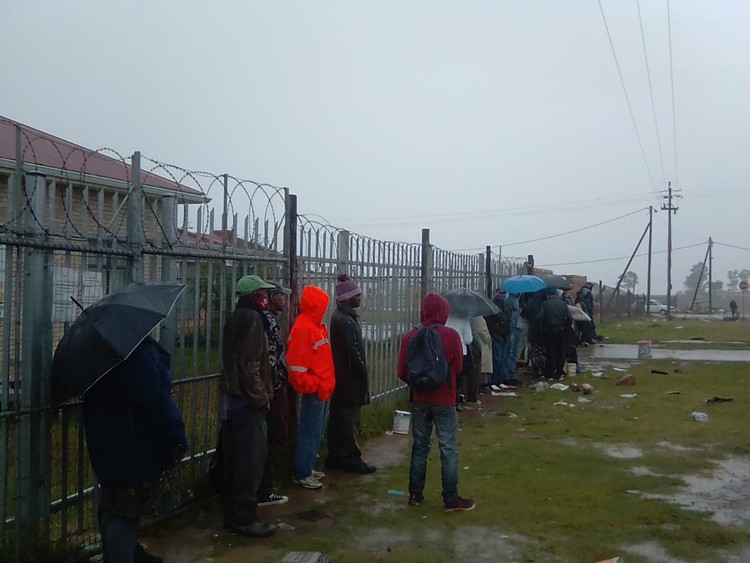
27 January 2021
Beneficiaries of the Covid-19 Social Relief of Distress grant queued for hours in the rain at the Post Office in Makhanda. The grant is due to come to an end this month. Photo: Loyiso Dyongman
In the long queues outside Joza Post Office in Makhanda on Wednesday morning, beneficiaries of the Covid-19 Social Relief of Distress (SRD) grant are hoping for a miracle. The R350-a-month grant is due to end on 31 January, and has been paid out to over six million people. But beneficiaries of the grant are holding out hope that the government will make a plan to extend it.
Lungisa Xhanti, 53, was standing in the long queue in the rain at about 10:30 am. He said he arrived there at 6:35 am.
“You can see from the fact that huge numbers of people don’t care about this rainy weather that they desperately need this money. The reason for this is the high unemployment rate in this country. These long queues are not just happening here in Makhanda. This is the same all over the country. Some people are sleeping here in the Post Offices just to make sure that they are the first ones to get the money in the morning. If people were not that desperate for this money they wouldn’t sleep here or stand in the rain for hours. “
“Government needs to think deeply about this. I’m one of those who will be sitting at home without hope after this grant,” said Xhanti.
Twenty-one-year-old Lizole Skadeni and Asanda Klaas, 19, were patiently standing without umbrellas in the rain.
Skadeni said he lives with both parents and he passed his matric in 2018. But he was unable to further his studies due to financial constraints.
“I have been getting this grant since last year and it is helping a lot at home. My parents are working but the money they get is not enough. I know the money is coming to an end this month and this is the last payment we’re getting. I’m going to search for a job because there is no hope that it will be extended,” said Skadeni.
Klaas said she matriculated in 2019 but could not study further because her parents were struggling. “The grant made a huge difference and I was happy when it was introduced. It is going to leave a huge gap in our lives.”
Phumelele Nyoka, 46, who is unemployed, said he would wait in the queue in spite of the rain rather than going back home, 40 minutes walk away. He said the cupboards were empty at his house.
“I used to collect metal and go to sell it at the metal scrapyards. My cousin helped and applied for me for this grant. I received it in July and bought myself groceries every month since then. I live with my wife and we both receive this grant. I don’t know what is going to happen as it comes to an end now. We’re going back to the struggle life of sometimes sleeping with empty stomachs,” said Nyoka.
Mpumezo Magingxa, 51, lost his part-time job when the lockdown started last year and did not qualify for unemployment benefits. “I applied for this grant and now I don’t know what next. President Ramaphosa should extend it since the economy has not fully opened up,” said Magingxa.
The Black Sash and other civil society organisations have written to Ramaphosa asking him to extend and increase the grant “to avert a humanitarian crisis”.